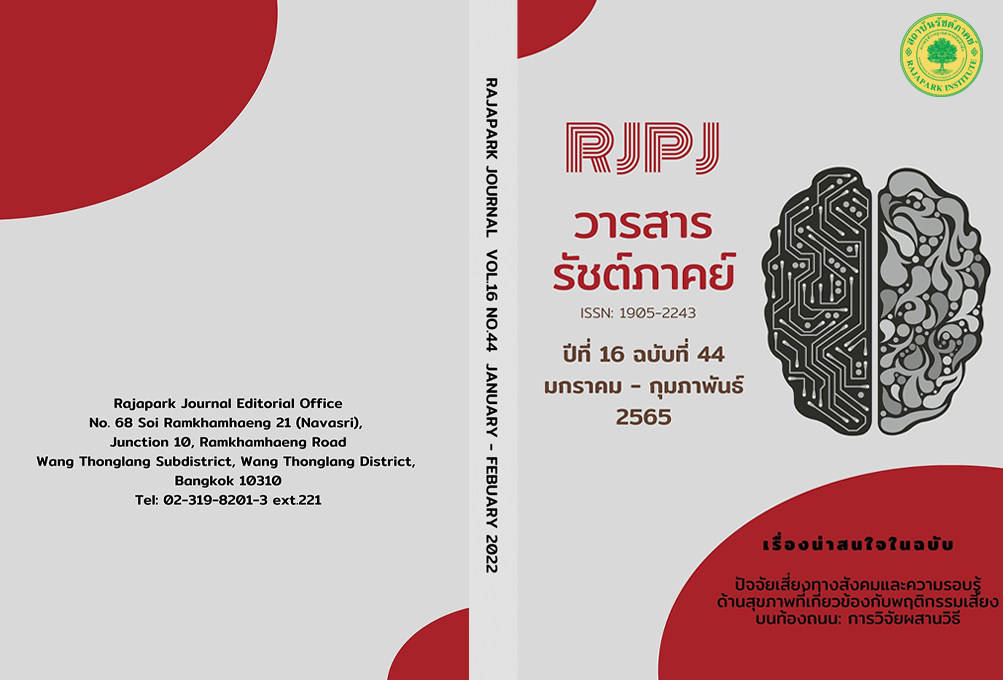Development of an Occupational Skill Inventory for Local People Who Need an Income Increasing at Sobprab District, Lampang
Main Article Content
Abstract
The aim of this study was to 1) develop and test the psychometric property of occupation skill inventory and 2) analyze the growth of occupational skills of local people at Sobprab district, Lampang. The design of this research was research and development. The procedure of developing scale and analyzing the growth of occupational skills appeared in three phases. Phase I: Creating an occupation skill inventory. Phases II: Developing and testing psychometric property of occupation skill inventory. Data were collected from 9 experts by using purposive selection and 30 local people by using simple random sampling. Phase III: Analyzing the growth of occupational skills of 45 local people that samples were selected by voluntary selection. Data were analyzed by using descriptive statistics include of mean, standard deviation, the content validity ratio (CVR) analysis, analysis of relativity by Cronbach's alpha tests, and also t-test. The results revealed that 12 items reached the criterion of content validity and had a great discriminant score to discriminate people who had an occupation skills difference. The initials evidence of the reliability of occupation skill score reported the moderate level with Cronbach alpha equal 0.63. Furthermore, the result of the growth of occupational skills revealed that the posttest score of occupational skills was significantly higher than the pretest score of occupational skills at the .05 level of significance.
Article Details

This work is licensed under a Creative Commons Attribution-NonCommercial-NoDerivatives 4.0 International License.
Views and opinions appearing in the Journal it is the responsibility of the author of the article, and does not constitute the view and responsibility of the editorial team.
References
Brewer, L. (2013). Enhancing youth employability: What? Why? and How? guide to core work skills. International Labour Office, Skills and Employability Department. Retrieved August 1, 2021, from https://www.oitcinterfor.org/sites/default/files/file_publicacion/wcms_213452_0.pdf
Changchai, A., Srisuantang, S., & Tanpichai, P. (2017). The development of the agricultural learning activities through community participation: a case study of Kasetsart University Laboratory School, Kamphaeng Sean Campus. Veridian E-Journal Silpakorn University, 10(2), 1544-1560.
Department of skill Development (2018). Skill development quality assurance. Retrieved July 18, 2021, from https://www.dsd.go.th/DSD/Doc?page=4
Division of Rice Research and Development (2016). Rice knowledge bank. Retrieved July 21, 2021, from https://www.ricethailand.go.th/rkb3/
Equitable Education Fund. (2018). Equitable Education Fund Act. Cabinet and royal gazette publishing office. Retrieved July 21, 2021, from http://www.ratchakitcha.soc.go.th/DATA/PDF/2561/A/033/1.PDF
Kelley, A. C., & Bridges, C. (2005). Introducing Professional and Career Development Skills in the Marketing Curriculum. Journal of Marketing Education, 27(3), 212-218.
Hendrickson, A., Huff, K., & Luecht, R. (2010). Claims, evidence, and test specification. Applied Measurement in Education, 23(4), 358-377.
Johnson, D. W. (1993). Reaching out: Interpersonal effectiveness and self-actualization (5th ed.). Boston: Allyn and Bacon.
Kanchanawasri, S. (2009). Classical Test Theory (6th ed.). Bangkok: Chulalongkorn University.
Kholis, N, Kartownagiran, B., & Mardapi, D. (2020). Development and validation of an instrument to measure a performance of vocational high school. European Journal of Educational Research, 9(3), 955- 966.
Lawshe, C. H. (1975) A Quantitative Approach to Content Validity. Personnel Psychology, 28, 563-575.
Lertwathanawanit, S. (2017). The development of activities for learner’s development by project-based learning to enhance career skills and career attitudes for high school students (Master of Education). Graduates school: Silpakorn University.
McClelland, D.C. (1985). How motives, skills, and values determine what people do. American Psychologist, 40(7), 812-825.
Pasiphol, S., (2013). Educational measurement and evaluation. Bangkok: Chulalongkorn University.
Phornprasert, W., Parnichparinchai, T., Prachanban, P., & Ongardwanich, N. (2020). The development of student digital citizenship scale and norms in higher education institutions. Journal of Education Naresuan University, 22(3), 217-234.
Super, E. D., & Crites, O. J. (1968). Appraising Vocational Fitness. Delhi: Universal Book Stall.


